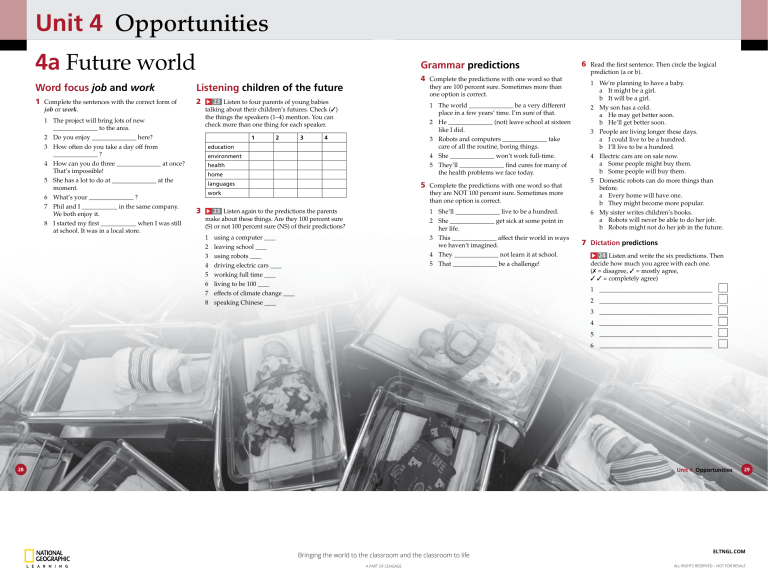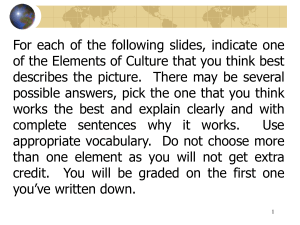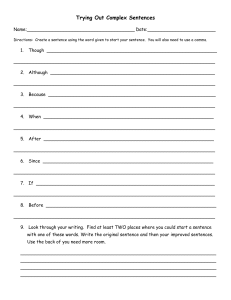
Unit 4 Opportunities 4a Future world Grammar predictions Word focus job and work Listening children of the future 1 Complete the sentences with the correct form of 2 job or work. 1 The project will bring lots of new to the area. 2 Do you enjoy here? 3 How often do you take a day off from ? 4 How can you do three at once? That’s impossible! 5 She has a lot to do at at the moment. 6 What’s your ? 7 Phil and I in the same company. We both enjoy it. 8 I started my first when I was still at school. It was in a local store. 4 Complete the predictions with one word so that they are 100 percent sure. Sometimes more than one option is correct. 23 Listen to four parents of young babies talking about their children’s futures. Check (✓) the things the speakers (1–4) mention. You can check more than one thing for each speaker. 1 2 3 be a very different 1 The world place in a few years’ time. I’m sure of that. 2 He (not) leave school at sixteen like I did. 3 Robots and computers take care of all the routine, boring things. 4 She won’t work full-time. 5 They’ll find cures for many of the health problems we face today. 4 education environment health home 5 Complete the predictions with one word so that languages they are NOT 100 percent sure. Sometimes more than one option is correct. work 3 23 Listen again to the predictions the parents make about these things. Are they 100 percent sure (S) or not 100 percent sure (NS) of their predictions? 1 2 3 4 5 6 7 8 live to be a hundred. 1 She’ll 2 She get sick at some point in her life. 3 This affect their world in ways we haven’t imagined. 4 They not learn it at school. 5 That be a challenge! using a computer leaving school using robots driving electric cars working full time living to be 100 effects of climate change speaking Chinese 6 Read the first sentence. Then circle the logical prediction (a or b). 1 We’re planning to have a baby. a It might be a girl. b It will be a girl. 2 My son has a cold. a He may get better soon. b He’ll get better soon. 3 People are living longer these days. a I could live to be a hundred. b I’ll live to be a hundred. 4 Electric cars are on sale now. a Some people might buy them. b Some people will buy them. 5 Domestic robots can do more things than before. a Every home will have one. b They might become more popular. 6 My sister writes children’s books. a Robots will never be able to do her job. b Robots might not do her job in the future. 7 Dictation predictions 24 Listen and write the six predictions. Then decide how much you agree with each one. (✗ = disagree, ✓ = mostly agree, ✓ ✓ = completely agree) 1 2 3 4 5 6 28 Unit 4 Opportunities Bringing the world to the classroom and the classroom to life A PART OF CENGAGE 29 ELTNGL.COM ALL RIGHTS RESERVED – NOT FOR RESALE 4b Now what? 4 Correct the factual mistakes in these sentences. 1 Lorna’s brother is finishing his apprenticeship soon. Vocabulary education Reading going back 1 Complete the questions with these expressions. 2 Look at the photo of Lorna. Decide which option 2 Lorna will be back in Vancouver next week. you think is correct in each question. Then read the email on page 31 and check your ideas. 3 She’s going to look for a new job in Los Angeles. 1 Is she in a bar or a café? 4 She’s found somewhere to live in Vancouver. 2 Is she a waitress or a chef? 5 She won’t be able to stay with Brett. In your country: 1 At what age can you legally ? 3 Does she work there, or is she the owner? 6 She promises to bring her brother to Hollywood. 2 Do many teenagers after compulsory education? 5 Is she single or married? Then answer the questions. become an apprentice drop out of college get a degree go to university leave school pass an exam retake an exam stay in school 4 Is she in her twenties or her thirties? 3 Read Lorna’s email again. Answer the questions. 3 What is the minimum grade you need to ? 4 How many times can you 1 Where is she from? 2 Where has she been for the past year? after you fail it? 5 Do people home or in other towns? 6 Is it easy to factory? close to 4 What does she think of Los Angeles? in a 7 How many years does it take to ? 8 Do many people get a job instead? 3 Why is she writing to her brother? and Hey little brother, how are you doing? I bet you can’t wait to leave school and start that apprenticeship. I can’t remember if you got a place at Autofit or City Bridges … Anyway, here’s some news—I’m coming back after this job. Don’t tell Mom yet—I want to surprise her. I’ll be back in Vancouver in May or June, I think. The café I’m working in is losing customers and money, and two staff members are leaving next week! I’ll be next, I bet ... So I’m going to take a few months off and see what turns up back home. I could look for another job here, but after almost a year of waitressing I feel like doing something new. Los Angeles has been great, but I’m not going to stay here forever. I suppose I’ll have to think about what I’m going to do in the long term at some point soon. Grammar future forms 5 Match the future forms in the sentences (1−8) with the uses (a–d). 1 We’re going to see the Futures exhibition on Saturday. Do you want to come? 2 We’re meeting at the door at one-thirty. 3 The office doesn’t open until nine o’clock. 4 OK then, I’ll see you later. Have a nice afternoon. 5 Did you hear? Bob and Vicky are getting married next summer. 6 I’m not going to continue with the course, I’m afraid. I don’t have the time. 7 Don’t forget—the clocks go back next weekend. 8 We can all go in the same car—we’ll pick you up at ten. a a plan or intention decided before the moment of speaking b a decision made at the moment of speaking c an event that follows a regular schedule or timetable d a fixed arrangement to do something at a specified (or understood) time in the future 6 Look again at the uses of future forms in Exercise 5. Then write sentences using the appropriate form. 1 I / look for a new job (a) I’ll need to find somewhere to live in Vancouver, that’s the first thing. I guess you’re going to stay at home with Mom. Apprentices don’t earn much, do they? I was talking to Brett and he’s staying on next year to do another course at college, or something, so I might be able to stay with him while I do some job-hunting. If that doesn’t work out … well, I’ll think of something! I may even move back to live with you and Mom! But at 25, I don’t think that’s such a good idea. 2 I / start my new job next week (d) Anyway, this is just to let you know my plans, as far as they go at the moment! See you in a couple of months—I’ll bring you a Hollywood mug! 7 I / help you study (b) Love, Lorna xxxx 3 I / meet you tonight (b) 4 the bus / leave at eight o’clock (c) 5 my friend / drop out of college (a) 6 my friend / take an exam tomorrow (d) 8 the exam / take place at the end of June (c) 7 Pronunciation extra /l/ 25 Listen to the sentences. Write the word from each sentence which includes the letter l. Repeat the sentences. 1 2 3 30 4 5 6 Unit 4 Opportunities 31 4c Looking ahead Vocabulary pay and conditions 3 1 Circle the best option. 1 I’ll see you at three. I can get off early because I’m on flextime / overtime. 2 It’s hard to feel motivated when we haven’t had a bonus / pay raise in seven years. 3 I love working in a clothing store, especially because they give staff discounts / pension plans on the products! 4 I'm doing really well, so I hope I get a promotion / salary soon. 5 I'm looking for part-time work / wages because we have a young family. 6 I won’t be able to go traveling with you. I only get one week’s long hours / paid vacation this year. 4d Would you mind … ? 2 Grammar extra predictions with going to 26 Listen again. Are the sentences true (T) or false (F)? 1 The host talks about last week’s program. 2 Anton doesn’t want to settle down yet. 3 Anton’s job pays well. 4 Carey is about to start university. 5 Carey isn’t working at the moment. 6 Carey and Anton have both overcome challenges in their lives. T F T T T T T F F F F F We can use going to to make a prediction based on something that means the speaker thinks it is certain to happen: My company is in trouble. I’m going to lose my job. Match the situations (1–4) with the predictions (a–d). 4 Answer the questions using information from the radio program. 1 What is the “internet generation”? 2 What does Anton say about plans? Listening radio interviews 3 Why does Carey believe you need an open mind? 2 4 Why do you think the program is called Turning 21? 26 Circle the correct option (a–c). Then listen to part of a radio program and check. 1 How old are the people being interviewed? a less than fifteen years old b between twenty and thirty years old c more than forty years old 2 What do we call the occasion when you are given your university degree? a final meeting b graduation ceremony c leaving party 3 What do we call the occasion married couples celebrate every year? a engagement party b marriage ceremony c wedding anniversary u PREDICTIONS WITH GOING TO 5 Pronunciation extra ’ll a 27 The contracted form of will (’ll) is not stressed. Listen to these pairs of sentences. Which sentence do you hear first? 1 a b 2 a b 3 a b 4 a b b We’ll meet some of the “internet generation.” We meet some of the “internet generation.” We’ll find out what it means to be 21 today. We find out what it means to be 21 today. We’ll have my graduation ceremony. We have my graduation ceremony. I’ll try anything. I try anything. 27 Listen again. Practice saying the sentences. Vocabulary job requirements 1 Circle the best option. 1 Researchers need to be creative / well organized as they deal with lots of information. 2 Entrepreneurs need to be methodical / self-confident to be a success. 3 Farmers need to be creative / independent if they are self-employed. 4 Accountants need to be energetic / methodical because their work is very detailed. 5 Managers need to be creative / well organized when trying to solve problems. 6 Technicians need to be conscientious / self-confident, as their work can be routine. 1 2 3 4 I’m so nervous about this interview. The interview was awful. The other candidate was more experienced. Your resume is really strong. a b c d They aren’t going to offer me the job. She’s going to get the job. You’re going to get an interview. It’s going to be a disaster. Real life making and responding to requests 3 Use combinations of these words to complete the requests. You can use the words more than once. all right it 1 2 3 be mind can OK could to computer? do will is you I borrow your phone? I used your this application form? 4 5 if would have a look at give your name? letter for me? reading this 4 Pronunciation weak and strong auxiliary verbs 28 Listen and repeat the exchanges you hear. Pay attention to the weak and strong auxiliary verbs. 5 Listen and respond answering questions 29 Listen to each question about a job application process. Respond with your own answer. Then compare your response with the model answer that follows. Are you looking for a new job at the moment? 32 Yes, I am actually. Unit 4 Opportunities 33 4e I am enclosing my resume Writing a cover letter 1 Writing skill formal style a Which of these things (a–d) is not a feature of formal letters? a b c d concise sentences formal phrases to begin sentences contractions standard phrases to open and close the letter b Rewrite the phrases and sentences in the appropriate style for a cover letter. 1 Hi Mr. Brown, 2 I saw your ad. 3 Here’s my application form. 4 I’m a fun kind of person. 5 I’ve done this kind of work before. 6 Do you want to interview me soon? 7 Send me an email or text me. 8 All the best, 2 Read the profile and the advertisement. Underline the sections in the advertisement that correspond to the profile information. Profile: Manuel Santos • • • enthusiastic hard-working enjoys working with people Wants: a job in catering Experience: restaurants, cafeterias (U.S., Brazil) Availability: now 34 A Wordbuilding prefix re- Learning skills recording new words (1) u WORDBUILDING prefix re- ROMA CAFÉS Home About Jobs We are an expanding chain of specialty cafés looking for outgoing, energetic servers. • part-time position leading to full-time opportunity You will be responsible for: • serving customers • maintaining stock • maintaining a clean environment Characteristics of ideal candidates are: • some experience in catering or retail • excellent communication skills • hard-working and good under pressure • authorized to work in the U.S. Send application form and cover letter to: Jim.Kapoor@aroma Ref 119/XG Closing date October 31st 3 Write a cover email from Manuel Santos to go with the completed application form for this job. Adding re- to the start of a verb means “to do something again.” retake, reapply, redo, reread, rewrite 1 Match the beginnings of the sentences (1–7) with the endings (a–g). 1 What a mess! I’ll have to 2 After the hurricane, they had to 3 Apparently, most divorced people 4 Do we have to buy new gas bottles? Or can you 5 I lost my contacts list on my cell phone, but now it’s 6 There are big changes at work— they are 7 I wasn’t happy with my essay, so I decided to 3 Look at the strategies (a–e). Write notes for these words. Which information helps you remember how to use the word? hard-working: full-time: enclose: a b c d e how to say it in your own language how to pronounce it what kind of word it is (noun, adjective, verb, adverb) how to use it (example sentences) when to use it (in writing or speaking) 4 Organizing new words into groups can help you remember them. How many words from Unit 4 can you add to each group? Job titles Job requirements reappeared. rebuild many houses. redo all of this. refill these? remarry within a few years. restructuring the organization of the whole company. g rewrite the introduction and the conclusion. Pay and conditions a b c d e f Jobs and work Describing jobs 2 Some verbs that start with re- have the idea of “back” or “again,” but we don’t usually use the verb without the prefix. Look at the example. Complete the sentences with verbs from the box. Use the correct form. recover repeat reply return review 1 Sam was really sick, but he’s recovering now. what 2 Can you you said? I didn’t catch it all. 3 I’ll to my emails later. I’m in a hurry now. 4 It’s always a good idea to your work before you hand it in. 5 These new shoes don’t fit, so I’m going to them. Check! 5 Answer these questions. Then rearrange the first letters of the answers to give the name of a country from Unit 4. one. 1 If you don’t like your current job, look for a 2 Something every child has when they think about their future: 3 If you plan to do something, you to do it. 4 You can learn how to be an engineer here: 5 All employers want their employees to be this: 1 2 3 4 5 Letters Word 35

